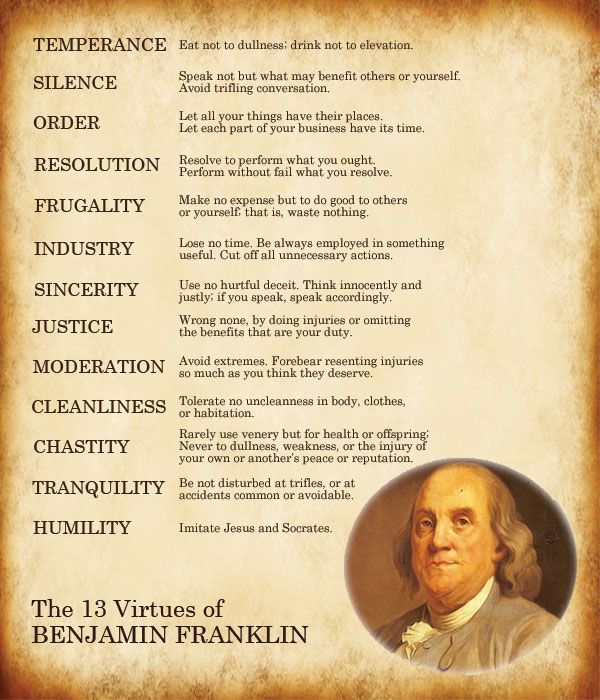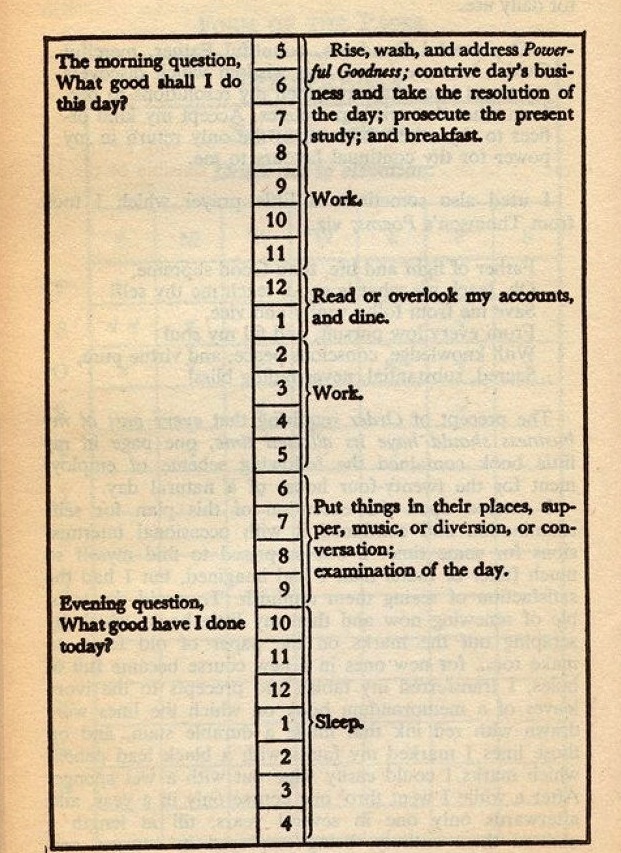Benjamin Franklin has created his success from almost nothing
by self-improvement and diligence, focusing on key virtues
Method: practice one virtue per week,
4 times a year (13*4=52 weeks/year),
Effectively master all virtues each season, again.
Smart!
Amazon.com: Benjamin Franklin's Book of Virtues (Books of American Wisdom): 9781429093552: Franklin, Benjamin: Books
Ben Franklin: The Thirteen Necessary Virtues @ fs
In book The Autobiography of Benjamin Franklin,
we find a list of thirteen virtues that Franklin
thought were necessary or desirable.
and valued for their ability to promote
individual and societal well-being.
- Temperance: Don’t overeat or overdrink. Maintain balance.
- Silence: Speak only when it benefits others or yourself; avoid trivial conversations.
- Order: Organize your belongings and allocate time for each task.
- Resolution: Commit to doing what you should and follow through.
- Frugality: Spend money wisely, avoiding waste.
- Industry: Stay productive; eliminate unnecessary actions.
- Sincerity: Be honest and just in your thoughts and speech.
- Justice: Avoid harming others and fulfill your duties.
- Moderation: Avoid extremes and don’t overreact to injuries.
- Cleanliness: Keep yourself and your surroundings clean.
- Tranquility: Don’t be upset by minor issues or unavoidable accidents.
- Chastity: Use sexual activity responsibly for health or procreation, not excessively.
- Humility: Learn from the examples of Jesus and Socrates.
I started with Temperance because it helps maintain a clear mind—a crucial quality when dealing with old habits and constant temptations. Once I established temperance, practicing Silence became easier. I aimed to gain knowledge while improving my character. Since listening contributes more to learning in conversations than speaking, I consciously avoided excessive chatter, puns, and jokes. Silence took second place."
Franklin's Method for Self-Improvement
- Daily Reflection:
At the end of each day, Franklin would reflect on his behavior,
noting any lapses in adhering to his virtues. - Focused Improvement:
He would not attempt to perfect all virtues at once.
Instead, he would focus on one virtue per week,
giving it extra attention. - Progress Tracking:
Over time, the goal was to see fewer marks on the chart,
indicating improvement in practicing each virtue.
Updated Summary (by AI)
Temperance: In our fast-paced world, it’s essential to maintain balance. Eat mindfully, neither to excess nor to the point of dullness. Similarly, be mindful of your drinking habits—don’t let it elevate you to a point where it impairs your judgment or well-being.
Silence: Words have power. Speak only when your words can benefit others or yourself. Avoid idle chatter and focus on meaningful conversations that contribute positively to your life and those around you.
Order: Organize your life. Give everything its place—whether physical objects or tasks. Allocate time for each aspect of your business, ensuring efficiency and preventing chaos.
Resolution: Set clear goals and stick to them. Resolve to do what you ought to do, and follow through without fail. Whether it’s personal growth, work, or relationships, commitment matters.
Frugality: Be mindful of your expenses. Spend only when it serves a purpose—to benefit yourself or others. Avoid wastefulness and invest wisely in things that matter.
Industry: Time is precious. Always engage in something useful. Cut out unnecessary distractions and focus on tasks that contribute to your growth, productivity, and well-being.
Sincerity: Honesty matters. Avoid deceitful behavior. Think innocently and justly, and let your words align with your thoughts. Authenticity fosters trust and meaningful connections.
Justice: Treat others fairly. Avoid causing harm through actions or omissions. Fulfill your duties and uphold the rights of others. Justice is the cornerstone of a harmonious society.
Moderation: Extremes rarely lead to good outcomes. Avoid overreacting to injuries or perceived slights. Maintain a balanced perspective, even when faced with adversity.
Cleanliness: Take care of your physical environment. Keep your body, clothes, and living spaces clean. A clutter-free environment promotes clarity of mind.
Tranquility: Life is full of minor disturbances. Don’t let trifles unsettle you. Accept unavoidable accidents gracefully, maintaining inner peace.
Chastity: In the context of modern relationships, prioritize emotional and physical health. Intimacy should be purposeful—for health or family planning—rather than driven by excess or societal pressure.
Humility: Learn from great examples. Imitate the wisdom of Jesus and the philosophical insights of Socrates. Humility allows growth and openness to new perspectives.





No comments:
Post a Comment